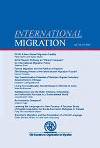Cape Verde, an island nation off West Africa, is a country moulded by migration from the time of settlement until today. This article traces theshifting migration flows to, through and from the archipelago.
These trends are related to developments in transportation technology and changes in the world economy, which have created fluctuations in the attractiveness of Cape Verde’s location. The article then proceeds to explore the Cape Verdean "migration ideology", which has historical roots but became consolidated through large-scale labour emigration in the 1960s and 1970s. By "migration ideology" we refer to the set of ideas that associate migration with specific meanings and causalities. The final section of the article addresses some of the contradictions and pressures that have become central to Cape Verdean migration over the past decade or two: restrictive immigration policies in destination countries increasingly prevent the departure of prospective migrants, a diverse flow of return migrants challenges established notions of migrant success, and the islands are attracting larger numbers of transit migrants and immigrants from China and the African mainland. The analysis raises the question of how the Cape Verdean national identity will evolve with the complexity of the migratory landscape.







